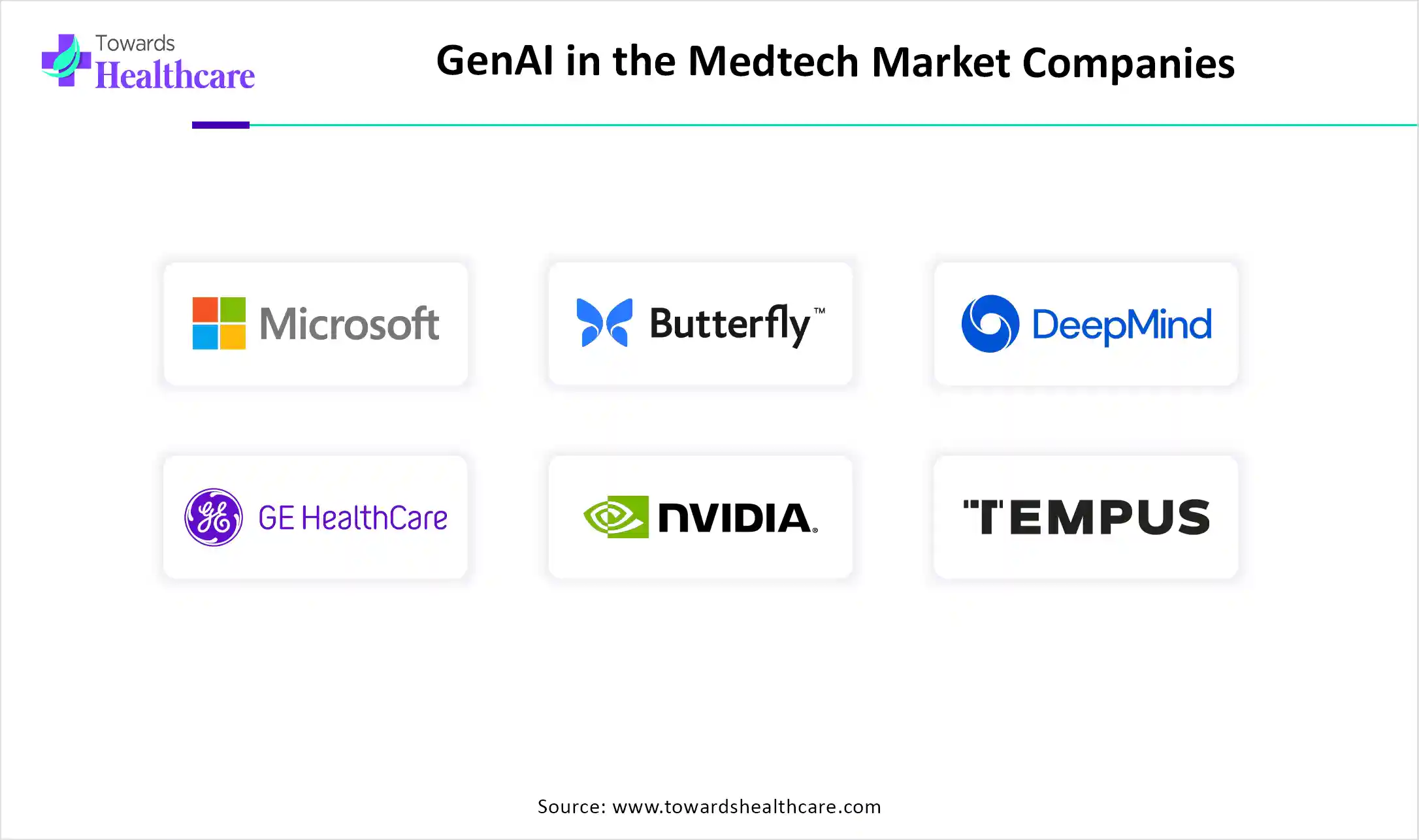January 2026

The global genAI in the medtech market is on an upward trajectory, poised to generate substantial revenue growth, potentially climbing into the hundreds of millions over the forecast years from 2025 to 2034. This surge is attributed to evolving consumer preferences and technological advancements reshaping the industry.
The global genAI in the medtech market is experiencing growth driven by factors such as rising chronic disease prevalence, breakthroughs in various areas including drug discovery, healthcare systems, and increasing demand for personalized medicines. In the coming era, gen AI has a crucial role in drug discovery, as it helps in the analysis of huge biological datasets and identifies the potential targets. This enables the discovery of novel drug candidates with desired therapeutic effects. Moreover, gen AI has vital opportunities in medical technologies, like as medical image scanning, along with in healthcare sectors including diagnostics, and pre-clinical and clinical phases.
Generative AI (GenAI) has been transforming the Medtech industry by revolutionizing different processes, from product development to patient care. The major contributing key drivers are the accelerating need for enhanced efficiency, personalized medicine, and optimized diagnostics. As well as, widely employed in several applications such as automating manual tasks and escalating drug discovery to enhancing surgical planning and patient engagement. In the clinical trials area, GenAI enables patient selection, data analysis, and trial design, which improves their performance and boosts the development lifecycle.
Growing Efficiency and Adoption in Various Areas
GenAI can automate repetitive tasks, simplify workflows, and minimize manual labor, which results in major time and expense savings for medtech companies. Also, GenAI algorithms enable analysis of a large volume of patient data to generate customized treatment plans and anticipate individual responses to therapies. Although it increases the accuracy and pace of medical image analysis, it leads to prior and more precise disease detection.
Stringent Regulatory Compliance and Data Security
In genAI in the medtech market, several challenges are emerging, such as having to face strict regulatory barriers, and ensuring compliance with data privacy and security is vital. Whereas, assuring responsibility and answerability for AI-derived errors or adverse outcomes is a major ethical restraint worldwide.
Growing Utilization in Drug Discovery and Surgical Approaches
Around the globe, the Gen AI is widely used in drug discovery to design complete novel molecules with favourable properties, and improve drug candidates by balancing factors such as synthetic feasibility, potency, efficacy, safety, and else related characteristics. As well as, it helps in the identification of probable disease targets and their interactions by analysing huge datasets. Also, in surgeries, gen AI-based robotic systems provide assistance to surgeons with precision and minimally invasive procedures, while also coupling with pre-surgical strategies.
North America held the major revenue share of the market in 2024. Contributing factors are the raised adoption of genAI in healthcare institutions, including hospitals, clinics, and diagnostic centers. It has the potential to integrate and simplify workflows. GenAI supports diagnostic accuracy, improving treatment planning, and optimizing patient outcomes. Moreover, rising chronic diseases such as cancer, cardiovascular conditions, and personalized medicines demand have increased, which ultimately impacts the drug discovery development by using genAI and detect the potential targets.
In the US, the gen AI is experiencing rapid growth driven by its raised adoption in medical imaging analysis, including X-rays, MRIs, and CT scans to support radiologists in the detection and diagnosis of diseases with higher accuracy and pace. Also, it helps in the anticipation of a patient's risk of progressing diseases, enabling proactive interventions and mitigative measures. As well as, the US possesses a well-developed and growing pharmaceutical industry and is a hub to various pharmaceutical companies, research institutions, and academic centers that are actively investing in AI technologies for drug discovery.
Canada has been experiencing significant growth due to robust healthcare infrastructure, a qualified staff, increased spending on healthcare, and a rising geriatric population, which are widely involved in the market as major drivers.
For instance,
Asia Pacific is expected to grow significantly in the upcoming years, with enhanced adoption in rapidly expanding pharmaceutical industries to develop novel treatments and drugs for growing chronic diseases. Although in the healthcare sector, ASAP has made a major contribution to developing the healthcare system coupled with AI, which ultimately increases the growth of the gen AI in the medtech market. Along with this, gen AI has focused on rising opportunities in the drug discovery sector as well, by escalating breakthroughs in novel drug development and to meet therapeutic needs in this region.
In China, the market is driven by growing digitalization in various industries, expansion of cloud networks, and data centers. Also, they are enhancing investments and collaboration with AI technology companies to fuel personalized medicine and accelerate the medtech growth.
For instance,
Japan is stepping into the breakthroughs in technologies for different applications. Rising advancements in numerous technologies in drug discovery, healthcare IT, and personalized medicine are propelling the market growth.
For instance,
A significant expansion of the gen AI in medtech market in Europe is propelled by the enhanced focus on eco-friendly medical technologies, with industries increasing emphasis on decarbonizing operations. As well as, Europe is widely incorporating integrated digital technologies, including gen AI and big data, to transform healthcare delivery and develop new opportunities for medical technology innovation.
The government of Germany has taken steps to encourage digital health and has also developed a strong regulatory framework for adopting novel medical devices. Besides this, Germany has a well-developed, robust healthcare system that enables a potential foundation for testing and providing novel technologies.
In the UK, the rising geriatric population has age-related health concerns and has more demand for medical technologies. These technologies, such as wearables, health monitors, remote diagnostic tools, and assistive robotics, will help patients to enable convenient and more precise results.

January 2026
January 2026
January 2026
January 2026